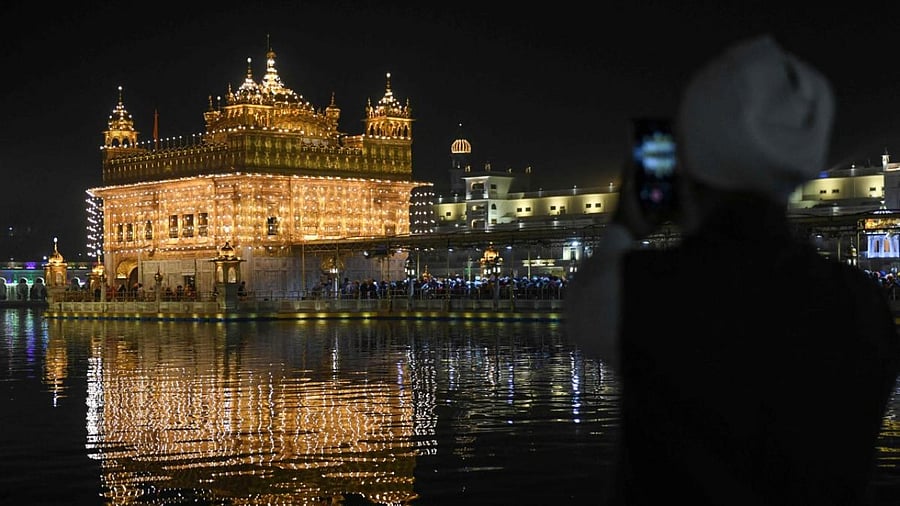
Sikhism was founded by Guru Nanak Devji (CE 1469-1539). His birthday is celebrated as Parkash Purab on Kartik Purnima. Born to a well-to-do family, he took to studying Hindu and Muslim religions almost from his childhood. Although he married and had a family, the urge to find spiritual truth for himself proved too great.
He temporarily abandoned his family and became a wanderer. He apparently travelled all over India and even as far as Persia or Arabia. He fasted, prayed and meditated. After many years of ascetic life, thought and contemplation, he felt qualified to convey his experience to the world. He didn’t renounce the world after enlightenment but returned to Punjab to teach the people the way of life.
He took a Hindu and a Muslim from downtrodden castes as his musician companions. The Guru composed his sermons in verse in Punjabi which his Muslim colleague set to music and sang with the lute. Thus, they went preaching from hamlet to hamlet. His teachings fired the imagination of Punjab's peasantry.
Nanak advocated a way of life that allowed for the discharge of domestic obligations of family and spiritual duties. He was content to be a teacher, made no claims of divinity or kinship with God. ’I came in the course of nature’ he said,’ and 'according to God’s order shall I depart’. There was no prophesy in his writings, and his words had no garb of a ‘message’. His teaching was essentially a crusade against cant and humbug of religion and he had the courage to pattern his life according to his teachings.
Nanak had a lot of respect for Kabir (CE 1440-1518) and Ravidas (CE 1450-1520) who were both subaltern Sants of northern India. While Kabir was a poor coarse cotton weaver, Ravidas was a tanner with the traditional occupation of leatherwork and the duty of disposing of dead cattle.
Kabir admonished Hindus and Muslims for their rituals. He refuted the theory of avatars, the sanctity of the Vedas, even the idea of rebirth. He used to declare, "Human birth is very rare, it comes but once to men — once the fruit falls from the tree, it won’t go back again". He was strong-minded and self-reliant and wanted everyone to be strong and self-reliant.
Sant Ravidas imagined a place named Begumpura where there is no sorrow, no property, no taxes, no pain, no wrongdoing, worry, terror or torture, where everything is right, an imperial kingdom rich and secure, where none are third or second — all are one: People can walk wherever they wish, they can stroll through fabled palaces unchallenged. Both these Sants did not renounce the world and they remained householders. They carried on their businesses and supported themselves by their own labour rather than depending on maths and institutions or on begging.
Nanak used the verses of Kabir, Ravidas, Namdev, Baba Farid and other Bhakti Sants liberally while preaching to the people. He founded his religion based on high ideals and was successful in implementing the utopia envisioned by Sants of that time. He categorically rejected the Hindu caste system. His writings abound with passages describing as ungodly the conduct of those who condemn God’s creatures as untouchable and impure. Nanak said:
Impurity of the heart is greed,
Of tongue, untruth,
Impurity of the eyes is coveting
Another’s wealth, his wife, her comeliness.
Impurity of the ears is listening to calumny.
He laid the framework of a casteless society by starting the institution called Langar, or the free community kitchen where food is served to all and they are requested to sit and eat together. It is a perfect symbol of sharing, caring and brotherhood. He also gave respect to manual labour as everyone is expected to take part in preparing meals, cooking, serving and washing the utensils.
Sikhs do not worship human beings as incarnations of God. Guru Nanak constantly referred to himself as a slave and servant of God. Guru Granth Sahib or Adi Granth has taken a stern Nirguna stance rejecting all compositions that imply worship of God envisaged ‘with form’. The Adi Granth is not like an idol in a Hindu temple or a Crucifix in a Catholic church. It is the source and not the object of prayer or worship. The Sikhs revere it because it contains the teaching of their Gurus. It is more a book of divine wisdom than the word of God.
Check out DH's latest videos: